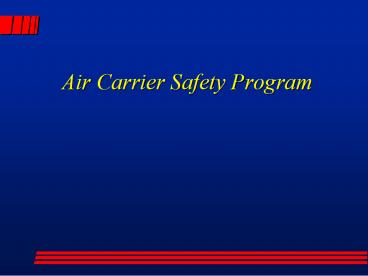Air Carrier Safety Program - PowerPoint PPT Presentation
1 / 22
Title:
Air Carrier Safety Program
Description:
Establish and maintain an Aviation Safety Program permitting Air Carriers to ... conditions and enhance safety awareness. Will address safety concerns ... – PowerPoint PPT presentation
Number of Views:167
Avg rating:3.0/5.0
Title: Air Carrier Safety Program
1
Air Carrier Safety Program
2
OBJECTIVE
- Establish and maintain an Aviation Safety Program
permitting Air Carriers to accomplish their
objectives in the safest manner possible.
3
WE WILL DISCUSS
- Development of the safety program
- Program elements
- Air Carrier Safety Officer
- Air Carrier Safety Committee
- Emergency Response Plan
- Internal Evaluation Programs
- Voluntary Disclosure
4
BENEFITS
- Positive economic effect
- Effectively complements the Internal Evaluation
and Self Disclosure Programs - Fosters team approach to certificate management
5
INITIATIVES
- Compliance for the 90s
- Industry / FAA Partnership
- Remedial Training
- Voluntary Self Disclosure (AC 120-56)
- Internal Evaluation Program (AC 120-59)
- The Air Carrier safety program incorporates these
programs
6
NTSB SAFETY RECOMMENDATION
- Recent NTSB Report, dated November 15, 1994
recommends - 15 - A mandatory airline safety program would
... correct problems before they lead to an
accident. - 19 - To be effective, Internal Evaluation
Programs should be mandatory for all Air
Carriers....
7
The Safety Program
- Is applicable to ALL employees
- Covers all property and equipment
- Is designed to ensure safe operating conditions
and enhance safety awareness - Will address safety concerns
- Provides employees with a timely means of
reporting unsafe conditions
8
Safety Program will provide for
- A process of reporting incidents
- Investigation of incidents and accidents
- Means of advising management
- Information feedback to employees
9
AIR CARRIER SAFETY OFFICER
- Appointed by company management
- Reports directly to CEO
- Qualifications
- Aviation Professional
- Line pilot / senior mechanic
- Ability to communicate effectively
- Strong interpersonal skills
10
Duties and Responsibilities
- Develop Safety Awareness in the company
- Advise and assist senior management in all
matters pertaining to aviation safety - Establish reporting system
- Maintain database
- Analyze directives, regulations, safety data, and
operational environment - Conduct safety surveys, monitor hazard reports, M
or Ds, etc.
11
Duties and Responsibilities
- Make recommendations / Ensure follow-up
- Coordinate with operations, training and
maintenance departments - Ensure that safety initiatives are incorporated
into all phases of company - Organize and conduct safety meetings
- Integrate and emphasize ground safety
- Solicit and process safety recommendations
- Investigate incidents and accidents throughout
the company
12
Duties and Responsibilities
- Coordinate with external organizations
- Maintain close liaison with FAA SPM
- FAA, State, and Local Government officials
- Aircraft manufacturers and other industry
organizations - Develop and maintain emergency response plan
- Act as recorder for the Air Carrier Safety
Committee
13
AIR CARRIER SAFETY COMMITTEE
- Philosophy is to promote aviation safety within
the company -- - Through the exchange of ideas and discussion
- Reported flight and ground hazards
- Monitoring the Air Carrier Safety Program
14
AIR CARRIER SAFETY COMMITTEE
- Should meet quarterly
- Special meetings can be called by any member
- Should be chaired by Senior Management
- ACSO will act as the recorder
- Minutes should contain agenda, decisions, and
corrective actions taken - Can be used as a tool to enhance the Safety
Program
15
Membership should represent
- D.O., D.O.M.
- ACSO
- Chief, Quality Control
- Check Airmen
- Line Pilots
- Mechanics
- Flight Attendants
- Union involvement
- Ground Operations
16
AIR CARRIER SAFETY COMMITTEE
- Eyes and ears of the company management
- Monitor all areas of the operation
- Identify safety concerns and deficiencies
- Make recommendations to senior management
17
EMERGENCY RESPONSE PLAN
- Should develop to provide guidance in the event
of an aircraft accident or incident - The plan should include
- Company policy
- Notification procedures
- Passenger and crew welfare
- Injury / casualty notification procedures
- Media relations
18
COMPANY SAFETY AUDIT
- Safety Program requires an internal evaluation
process AC 120-59 - An evaluation program will continually monitor
the companys policies and procedures - Ensures that the highest level of safety
compliance is maintained - An Air Carrier may voluntarily disclose apparent
violations even if an FAA Internal Evaluation
Program has not been established
19
VOLUNTARY DISCLOSURE POLICY
- The open sharing of apparent violations and a
cooperative, as well as advisory, approach to
solving problems will enhance and promote
aviation safety.
20
Air Carrier Voluntary Disclosure
- AC 120-56, January 23, 1992
- An Air Carrier can elect to voluntarily disclose
apparent violations to the FAA - The procedures can be applied to maintenance,
flight operations, and security aspects of the
companies operation
21
CONCLUSION
- Aviation safety is best served by programs that
allow certificate holders to identify and correct
their own instances of non-compliance - The FAA encourages establishing the Voluntary
Disclosure and Internal Evaluation Programs to
realize the full benefits of the Air Carrier
Safety Program
22
CONCLUSION
- The Air Carrier Safety Program
- Has a positive economic effect
- Effectively complements the Voluntary Disclosure
and Internal Evaluation Programs - Provides a team approach with the FAA and the air
carrier to address the carriers safety issues
and regulatory requirements































